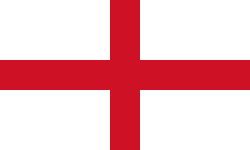History
The origin of the office of Admiral of the West [4] dates back to 1294, with the appointment of Sir William, Baron de Leybourne, originally styled Admiral of the West and Irish Sea. He also jointly held the title of Admiral of the South until 1306, when that post was left vacant; it resumed very briefly in 1325. In 1326, the post of Admiral of the South and its command duties were merged with that of Admiral of the West. The office was styled by different names from its establishment, such as Admiral of the West and Irish Sea and Admiral on the Western Station (1294-1306), [5] Admiral of the Western Squadron and Admiral West, of the mouth of the Thames (1306-1406). With the exception of the periods for the creation of the offices of the Admiral of the North and West from 18 July 1360 to 16 January 1361, and the office of Admiral of all the Fleets about England from 16 January 1361 to 28 April 1362, no further official appointments were made. [5] The office resumed again until the creation of the office of the Admiral of England from April 1385 to 18 March 1388, [5] when once more appointments ceased. The post was revived in 1388, and lasted until the creation of the office of Admiral of England, Ireland and Aquitaine some time between 1406 and 1412. [6] The first royal commission as Admiral to a naval officer was granted in 1303. By 1344 it was only used as a rank at sea for a captain in charge of a fleet or fleets. [7]
This command, along with that of Admiral of the North, was regarded as one of the most senior posts in the English navy from the end of the 13th century until the beginning of the 15th century. [8]
- Rank and Role
The administration of English Navy from the end of the 13th century was decentralized into three regional 'admiralties' until the end of the fourteenth Century. [9] The appointment of an admiral was not regarded by the English government at the time as an honorary post subordinate to a military rank, their importance attached to their office can be confirmed by the recording of their allowances paid recorded in the Calendar of Patent Rolls. [10] In the fourteenth Century Admirals were paid a respectable salary which was only granted because the position was viewed as substantially important. In addition the rank of admiral was only granted to men of high prestige within feudal hierarchy, most recipients of the office were usually knights but more often earls. [11] The Admirals duties usually consisted of assembling fleets for naval expeditions undertaken by the monarch on campaign, maintaining order and discipline and supervising the work of the Admiralty Courts for each region. On major military expeditions the Admiral would go to sea with their fleets and accompany the overall Commander-in-Chief of both sea and land forces usually the King himself but sometimes a nobleman of higher rank than the admiral. Their role was to observe and direct naval battles but not necessarily taking part in them, themselves. [11] However, from 1344 onward their role was moving from primarily administrative one to that of a seagoing command. [12]
In 1337 the first known record of the appointment of a "vice-admiral' was granted to a Nicholas Ususmaris, a Genoese, he was made Vice-Admiral of the King's fleet of galleys, and all other ships of Aquitaine. However these appointments were few and far between. There was two further instances of the appointment of Vice-Admirals to Sir Thomas Drayton as Vice-Admiral of the Northern Fleet and Sir Peter Bard Vice-Admiral of the Western Fleet both on 28 July 1338. [13]
Special assistants were appointed to handle two important sub-divisions of the admirals powers. The first was the admiral's lieutenant, or deputy, referred to as sub-admirals, who handled administrative and legal duties and each of these admirals had one and often retained more knowledge than the Admiral himself in relation to the sea and coastal communities. [14] It would not be until the early 15th century that they would appointed on a more regular basis however they were referred to at this time as the admirals Lieutenant-General this office eventually became known as the Lieutenant of the Admiralty. [15]
The second was the Wardens of the Coast for each region who were responsible for the direction and co-ordination of the fleet, the equipping of boats and processing payments to sailors and superintendence of the Sea Guard Militia assigned to each maritime coastal county. [11] From the mid fourteenth century there was a move to centralise these regional naval authorities as seen with the appointment of the Admiral of the Southern, Northern and Western fleets sometimes referred to as Admiral of the Fleet or Admiral of England and the Admiral of the North and West this tendency towards unifying regional naval authorities under one admiral eventually led to the creation of the office of the Lord-Admiral of England [11]
The Admirals were logistically supported by the Clerk of the King's Ships who looked after all the navy's finances whilst victualling of the navy was handled by another one of King's Clerks. [11]
This page is based on this
Wikipedia article Text is available under the
CC BY-SA 4.0 license; additional terms may apply.
Images, videos and audio are available under their respective licenses.
